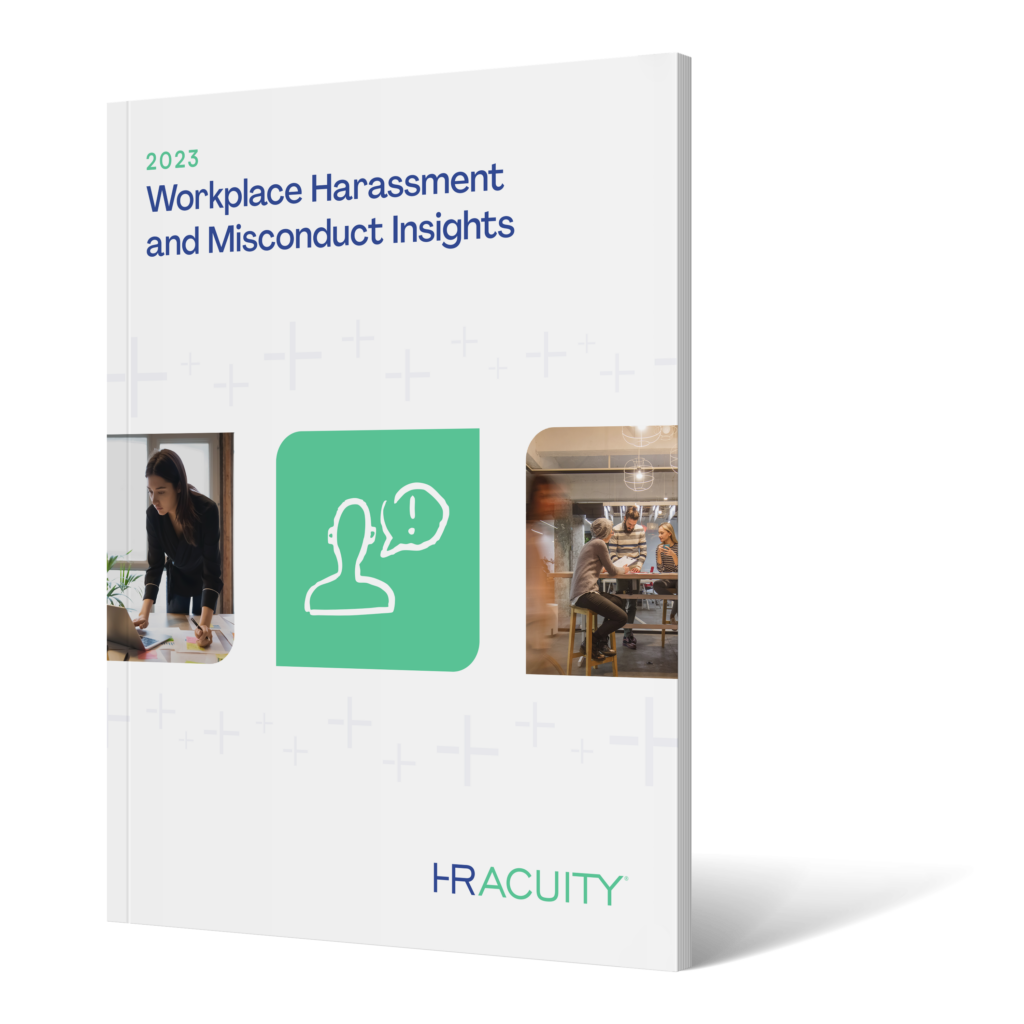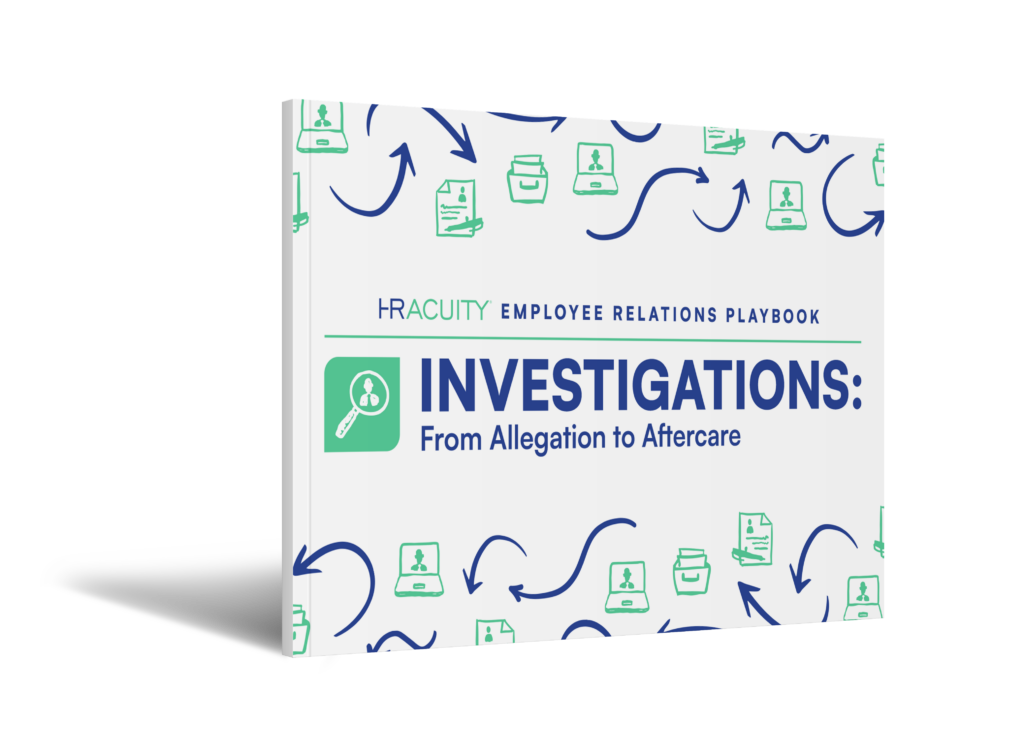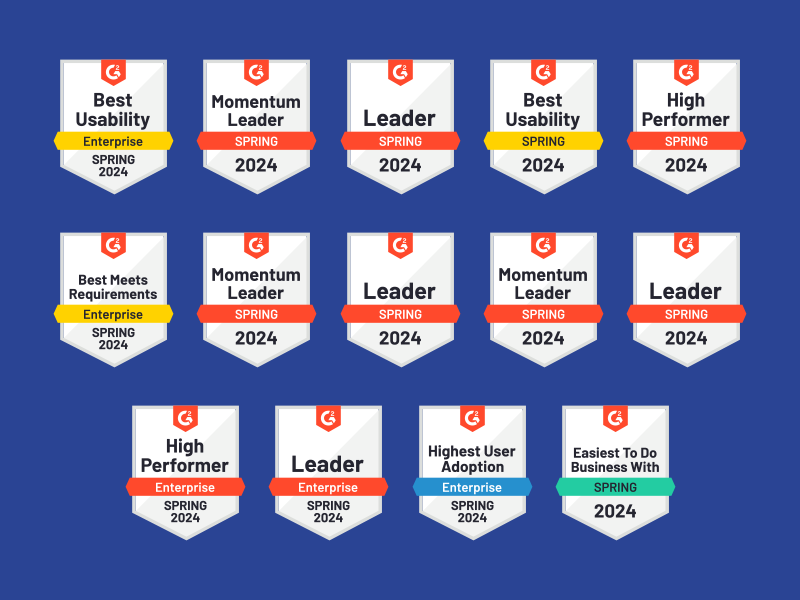As a human resources professional, it is probably the phone call or office visit you dread the most. When an employee calls to allege serious misconduct by a coworker, workplace investigations certainly follow. In today’s fast-paced business world, where employees are increasingly aware of their rights, and employers are under constant scrutiny, conducting a workplace investigation has become a critical tool for maintaining a healthy workplace culture. And for most employee-related events, the workplace investigation process would not be complete without an investigation interview.
A workplace investigation can have far-reaching implications on an organization, from ensuring compliance with legal requirements to improving employee morale and engagement.
This is where employee relations software and case management solutions, such as those offered by HR Acuity, can provide a significant advantage. Read on to gain valuable insights and strategies for upholding a productive and compliant workplace with the help of better HR investigations.
Table of Contents
What are Workplace Investigations?
A workplace investigation involves gathering information and evidence to determine whether an employee has violated a policy or engaged in inappropriate behavior. Whether it is a simple verbal discussion with employees or a more complex investigation, the employee relations team needs to ensure that the company remains compliant with employment laws, labor relations and internal policies throughout the entire process.
Workplace investigations are an essential part of maintaining a safe and respectful environment for employees, and can be initiated for various reasons, such as:
- Any type of harassment
- Discrimination
- Substance abuse
- Violence or threats against others
- Theft or vandalism
- Conflict of interest
- Breach of trust
- Abuse of sick leave
- Excessive absenteeism
- Other violations of company policies
Do Harassment Investigations Differ From Other Workplace Investigations?
Harassment investigations do not differ from other workplace investigations, but due to their sensitive nature a specialized approach may be warranted. In workplace harassment investigations, the focus is on unwelcome or offensive conduct directed towards an individual or a group based on protected characteristics such as race, gender, religion or disability. These inquiries demand a thorough understanding of relevant laws and regulations, as well as the ability to create a safe and supportive environment for the individuals involved. Additionally, confidentiality is often paramount in harassment investigations to protect the privacy of all parties concerned. Proper training for investigators, a clear communication strategy and a commitment to fostering a workplace free from harassment are crucial components in ensuring the success of these specialized investigations. For information on how to report workplace harassment, see our post here.
Prepare and protect your people and organization.
2023 Workplace Harassment and Misconduct Insights are available now!

When to do a Workplace Investigation
Not every office scuffle or misunderstanding warrants a formal workplace investigation, especially if the complainant and the respondent agree on what happened. In many cases, the problem can be resolved through a simple conversation with the offending employee. For example, if the situation appears to be mainly a personality conflict or rudeness, rather than serious wrongdoing, then you might decide you don’t need to formally investigate. An informal approach could be best if it’s a matter of miscommunication or misunderstanding of company policy. Do you need to gather more facts from other employees or relevant documents?
When you are not sure, it’s better to conduct a formal investigation immediately. If the problem turns out to be more severe than anticipated, failing to investigate can cause legal problems and continued workplace problems that interfere with productivity. Often, you can’t recognize how widespread or substantial a problem is until you ask enough questions.
As a rule of thumb, workplace investigations should always happen when:
- A formal complaint is filed
- A workplace policy is violated
Don’t take a long time to decide whether a formal investigation is necessary or not. In many cases, juries have awarded huge sums to plaintiffs because the employer’s response to a complaint was delayed, inadequate or inappropriate.
How Long is the HR Investigation Process?
Investigations should be completed as promptly as possible to minimize any potential harm to employees and the company, and to ensure details of the incident will not become muddled over time. However, the length of a workplace investigation can also vary depending on the nature of the issue. Some cases can be resolved quickly, while others may take several weeks or even months to complete. The more complex the investigation is, the more important it is to start ASAP.
How to Conduct an HR Investigation
Conducting a workplace investigation requires careful planning and execution to ensure that all relevant information is collected and analyzed objectively. And while every employee investigation is unique, your team can ensure a fair outcome by following the same fundamental principles and steps.
It is not uncommon for employees to perceive HR professionals as working to a certain outcome that is favorable to the company, and this belief can skew their views of the legitimacy of the workplace investigation process – and the trustworthiness of their HR overall. Using a consistent methodology demonstrates that a structured process is in place by your organization to deal with these situations in a fair and credible way.
So the question is, do you know how to conduct fair HR investigations in the workplace that include a well laid-out interview process? To take advantage of the powerful fact-finding value implicit in a well-conducted investigation, here are eight essential HR investigations steps:
- Take immediate action when necessary
- Designate an investigator
- Establish the scope and make a plan
- Conduct interviews
- Examine the evidence
- Create a report
- Share the results
- Aftercare
1. Take Immediate Action When Necessary
Successful and fair HR investigations begin by determining if there are any steps that should be taken immediately, such as sending a disruptive employee home for the day or rearranging schedules to prevent further conflicts.
2. Designate an Investigator
To ensure objectivity, consider your choice of investigator with care. If you don’t feel able to remain impartial, identify a suitable colleague who has no personal involvement in the case or, if this isn’t possible, consider bringing in external help.
3. Establish the Scope and Make a Plan
This phase of the workplace investigation process includes:
- Defining the specific issue or incident being investigated, including which policy or policies may have been violated.
- Identifying the parties involved and determining the timeframe of the examination.
- Gathering as much information as possible about the incident, including where and when it occurred, who witnessed it and any relevant documents or electronic communications or records.
Successful interviews hinge on careful planning, which includes considering who you need to interview and in what order.
To thoroughly and accurately ascertain the facts of any employee misconduct allegation, human resources or the professional assigned to do the investigation interview will need to interview both the employee making the accusation and the employee accused of misconduct. In addition, the investigator must also determine if there are any witnesses — if there are, they must interview them as well.
As a general rule of thumb, HR attorney Jessica Walberg of Ford & Harrison, LLP recommends interviewing the complainant, the accused, any witnesses and then finally the complainant again. This allows you to re-examine their original account using information revealed in the interviews. However, every situation is different and will need to be assessed relative to the allegation.
You also need to think through the investigation questions you’re going to ask the interviewees. To help create an even playing field, human resources can develop a standard list of questions that should be asked during workplace investigation interviews. Core interview questions can ensure thorough fact-finding and an equitable approach to the interviewees. The interviewer can, and should, ask additional questions. Creating a standard list will help ensure that the right questions don’t go unanswered.
4. Conduct interviews
For workplace investigations, interviews are crucial to a fair outcome. Done correctly, they can uncover essential information and corroborate a co-worker’s account of wrongdoing. Performed poorly, they can lead to serious consequences for a company, including substantial damage, back pay awards, or even full reinstatement of an employee.
Start interviews by introducing all attendees, generally explaining the purpose of the interview and outlining the candor and integrity you expect from all parties when answering questions – and the consequences if they fail to comply. This lays the ground rules and demonstrates that everyone is being held to the same standard.
Asking strategic, well-crafted questions will help you uncover the truth. Questions that require a simple ‘yes’ or ‘no’ response will only take you so far. The best approach is to start broadly and ask non-threatening questions before moving on to the details. In a SHRM article on detecting lies and deception, Michael Wade Johnson, founder and CEO of Clear Law Institute, recommends using a relaxed conversational style to encourage interviewees to open up. He also suggests asking interviewees to tell their story in reverse order, from finish to start, which is easy if they’re telling the truth but more difficult if they’re working from a memorized script.
Asking follow-up questions or rephrasing questions is a good way to examine and verify the facts for greater accuracy. You should also review the interviewees’ accounts against available evidence – which might be in the form of emails, records, or other documentation.
We outline more tips for getting to the truth in employee investigations on the HR Acuity blog Key Steps to Ensuring Honesty During Investigations.
Bear in mind that it’s not just what the interviewees say, but how they say it, and how they act, that is revealing. Paying special attention to body language can highlight when an interviewee is being less than truthful, indicating when you should dig deeper.
5. Examine the evidence & come to a conclusion
With the interviews complete, you now need to decide on the merits of the claim and, if you find evidence of misconduct, the most appropriate action, which can include:
- Disciplinary action
- Termination of employment
- Reassignment of duties
- Training or coaching
- A change in workplace policies and procedures
To help ensure fair and consistent remediation, take a close look at any data you hold on identical or similar cases in your organization and how they were handled. For example, if you previously suspended a manager who made sexist comments but are now firing a supervisor for making equally inappropriate remarks, you may open yourself up to possible litigation.
During this process, management, including ER and HR, must respect the employees’ rights, particularly if they’re found to be innocent of any wrongdoing. For example, if an employee is falsely accused of misconduct, the employer should take steps to clear their name and ensure that their reputation isn’t tarnished. In some cases, this may even involve compensation for any harm or damages suffered as a result of the investigation.
Whatever you decide, it is important to document the conclusions you reached, the rationale behind them and any remedial action. This shows that you exercised due diligence and acted fairly.
6. Create a report
It’s not enough to do the right thing in an investigation. You also need to evidence it by keeping clear and detailed documentation throughout. A defensible workplace investigation case file should include:
- A comprehensive investigation report
- Legible and logical interview notes
- Supporting documentation – with names, dates and locations
- The actions you intend to take
Having the right documentation provides a formal record of the entire investigation. It also demonstrates procedural fairness, protecting your organization in the event of legal action.
Download our workplace investigation report template to get started.
7. Share the results
The outcome of the investigation must be communicated to all parties involved, including the complainant, accused and witnesses. Managers must be careful to communicate the findings in a clear and sensitive manner, without revealing any confidential information or violating any privacy laws. They must also be prepared to answer any questions or concerns that may arise from the investigation, particularly from employees who may be impacted by the outcome.
The results of a workplace investigation may possibly lead to litigation, especially if the complainant or accused feels that their rights have been violated or that the employer has acted unfairly. In these situations, it may be necessary to seek legal counsel of your own.
8. Aftercare
In leading-edge ER functions, aftercare goes beyond risk mitigation to avoid retaliation. Instead, it’s treated as importantly as the investigation itself and it touches everyone impacted by the circumstances — whether the allegation was substantiated or not. After all, every person involved feels an impact and walks away with their own unique perception of the process and experience — aftercare is that critical moment that you make or break trust in the layers of people around the issue. Best practices include checking in with everyone one month post close and then at regular intervals every few months. They include training or other programs to openly address workplace concerns. They include documenting the initiatives. Finally, they include forecasting resources so that when you commit to following-through, you keep your promises.
4 Best Practices for Conducting Fair HR Investigations
1. Explain to the person why they are being interviewed
Before the interview begins, the person conducting the interview must inform the interviewee why they are being interviewed along with the nature of the complaint. In general, it is not appropriate, or advisable, to provide a witness with specifics regarding the allegation. Let the employee know that you will be asking questions related to an incident in the workplace, but may not be able to provide complete details to ensure confidentiality for all involved.
When interviewing the accused, you may choose to hold off telling the interviewee that they are the subject of the complaint until later questioning. However, it is important that the subject of an investigation is provided an opportunity to give his or her side of the story. Doing so will require that complete details regarding the allegation are provided. Remember that a workplace investigation interview is a fact-finding exercise and the interviewer is primarily asking questions and listening — not providing information to the interviewee.
Access our most recent Employee Experience Survey to learn how employees feel about the handling of HR investigations in the workplace.
2. Adhere to your company’s HR investigation protocol
Every organization should have HR policies and procedures that clearly outline a workplace investigation protocol. Sometimes those guidelines will specify requirements for an investigation interview. Typically, only certain HR professionals or managers are deemed qualified, and therefore, permitted to conduct an investigation interview. Internal investigations must adhere to company guidelines; before any interviews are conducted, all relevant workplace investigation protocols must be identified and followed.
Download our interview protocols checklist.
3. Don’t delay the investigation process
If the employee making the misconduct allegation chooses to pursue the claim legally, the courts will evaluate the timeline of the workplace investigation and whether interviews were conducted in a timely manner. The goal of conducting timely interviews is to ensure that the parties are able to remember the facts as accurately and detailed as possible. If either the complainant or accuser involved in the misconduct allegation is away for a planned absence or holiday, HR should ensure that interviews are scheduled promptly after the person’s return, and the reasons for the delay should be documented.
Download the Employee Relations Playbook
Everything you need to know from
Allegation to Aftercare.

4. Document everything
From the moment an investigation starts, it’s important to capture and document the right facts in a consistent, compliant, secure format. While some fact-finding is obvious, such as the details surrounding the complaint, details that feel inconsequential in the moment can prove important later on, such as the date and location of the interview and an indication of the fact-finding protocols that were followed.
It is also critical that the notes are legible, ideally in an Employee Relations software solution.
Best practices include standardizing how you capture and store dynamic facts that often change, such as job titles, job locations, team members and direct managers. Quickly preserving this data in an investigation management solution helps avoid inadvertently deleting or losing evidence.
Why Do You Need an HR Investigation Process?
Each workplace incident is unique, but you need to establish clear and consistent protocols to conduct fair HR investigations. Without a proper process, you put your company at risk in a number of ways. Not only could a sloppy investigation result in the wrong action being taken, but also it could open you up to liability. Aggrieved employees can take civil action against your company, and any flaws in your investigation procedures could result in significant damages. Well-established rules for fair HR investigations also communicate to your employees that the company is truly invested in protecting their rights and is actively working to create a safe workplace for everyone.
Improve Your HR Investigation Process
A proper investigation takes time and money, but it can have many beneficial effects for the employer and employees. For example, it could identify additional instances of wrongdoing, guide employment decisions regarding the wrongdoing, avoid or minimize the employer’s liability, reduce legal costs, protect potential complainants from discrimination and prevent an injunction, which is a court order forcing the company to stop a particular action or behavior.
Ready to manage employee relations fairly and consistently? Learn how the HR Acuity workplace investigation management solution can equip your organization with a better way to document, investigate, and analyze employee issues.



